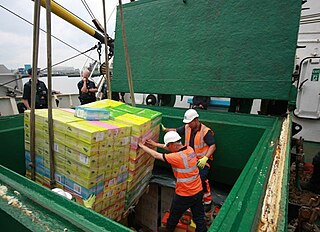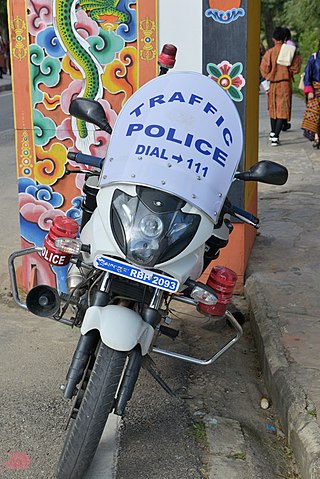
Smuggling is the illegal transportation of objects, substances, information or people, such as out of a house or buildings, into a prison, or across an international border, in violation of applicable laws or other regulations. More broadly, social scientists define smuggling as the purposeful movement across a border in contravention to the relevant legal frameworks.

The illegal drug trade, drug trafficking, or narcotrafficking is a global black market dedicated to the cultivation, manufacture, distribution and sale of prohibited drugs. Most jurisdictions prohibit trade, except under license, of many types of drugs through the use of drug prohibition laws. The think tank Global Financial Integrity's Transnational Crime and the Developing World report estimates the size of the global illicit drug market between US$426 and US$652 billion in 2014 alone. With a world GDP of US$78 trillion in the same year, the illegal drug trade may be estimated as nearly 1% of total global trade. Consumption of illegal drugs is widespread globally, and it remains very difficult for local authorities to reduce the rates of drug consumption.

The United Nations Office on Drugs and Crime is a United Nations office that was established in 1997 as the Office for Drug Control and Crime Prevention by combining the United Nations International Drug Control Program (UNDCP) and the Crime Prevention and Criminal Justice Division in the United Nations Office at Vienna, adopting the current name in 2002.

Transnational organized crime (TOC) is organized crime coordinated across national borders, involving groups or markets of individuals working in more than one country to plan and execute illegal business ventures. In order to achieve their goals, these criminal groups use systematic violence and corruption. Common transnational organized crimes include conveying drugs, conveying arms, trafficking for sex, toxic waste disposal, materials theft and poaching.

The Anti-Narcotics Force is a federal executive bureau and a paramilitary force of the Government of Pakistan, tasked with combating the narcotics smuggling and use within Pakistan. ANF works under the umbrella of Pakistan Army and Ministry of Narcotics Control (Pakistan) of which Shahzain Bugti is the minister since March 2022. Due to misconception on Section 4 of ANF ACT 1997, the force's head consisted of the active-duty general officer of Pakistan Army. Although the law prescribes that any competent person may be appointed as Director-General. Currently, a two-star Army Officer, Major general Muhammad Aniq Ur Rehman Malik is deputed as Director-General. The ANF also has sole responsibility for coordinating and pursuing Pakistan narcotics investigations abroad.
The illegal drug trade in China is influenced by factors such as history, location, size, population, and current economic conditions. China has one-sixth of the world's population and a large and expanding economy. China's large land mass, close proximity to the Golden Triangle, Golden Crescent, and numerous coastal cities with large and modern port facilities make it an attractive transit center for drug traffickers. Opium has played an important role in the country's history since before the First and Second Opium Wars in the mid-19th century.

Bhutan has a low crime rate. Incidents of petty crime are occasionally reported in the country. Violent crime is very uncommon. Some cases of drug abuse are reported; alcohol abuse is a problem. But in general, drug trafficking is low. The most serious threat to Bhutan's security is terrorism by different terrorist groups from neighboring countries illegally camped in the nation.

The Narcotics Control Bureau is an Indian central law enforcement and intelligence agency under the Ministry of Home Affairs, Government of India. The agency is tasked with combating drug trafficking and the use of illegal substances under the provisions of Narcotic Drugs and Psychotropic Substances Act.
The illegal drug trade in Guatemala includes trans-shipment of cocaine to the United States. According to some reports, Mexican drug cartels such as Sinaloa have also established poppy growing operations there. There is a reported relationship between the Mexican Los Zetas cartel and the Guatemalan Kaibiles military force.

The illegal drug trade in Latin America concerns primarily the production and sale of cocaine and cannabis, including the export of these banned substances to the United States and Europe. The coca cultivation is concentrated in the Andes of South America, particularly in Colombia, Peru and Bolivia; this is the world's only source region for coca.
United Nations Security Council Resolution 1817 was unanimously adopted on 11 June 2008.

Though the Cuban government does not release official crime statistics, Cuba is considered one of the safer countries in Latin America. Gun crime is virtually nonexistent, drug trafficking has been largely curtailed, and there is below-average crisis intervention from police. Murder rates are also below those of most Latin American countries, with an intentional homicide rate of 5.00/100,000 inhabitants in 2016, lower than any other country in the region.

Aviation Drug-Trafficking Control Act of 1984 is a United States Federal law amending the Federal Aviation Act of 1958. The statutory law authorized criminal penalties for the unlawful aerial transportation of controlled substances. The Act of Congress mandated the revocation of aircraft registrations and airman certificates by the Federal Aviation Administration whereas an aircraft aviator knowingly engages in the transit of illicitly used drugs. The Act established authority and a statute of limitations for the reissuance of airman certificates by the United States Secretary of Transportation.
In the late 1950s and early 1960s, the drug trade in West Africa rapidly expanded amid dramatic increases in US and European demand for cocaine, cannabis, and other drugs. This resulted in the expansion of two distinct trade routes, both of which went through West Africa. One route exported domestically produced cannabis from West Africa to South Africa, Europe, and Asia. The other trade route moved cocaine from Latin America and heroin from Afghanistan and Southeast Asia to Europe and the United States. In both of these routes, drug traffickers took advantage of trading networks created by Malian and Berber traders in colonial times to move drugs through the region, as well as West Africa's broader geographical location as an intermediate stop from Latin America and Southwest Asia to Europe and the United States. This was due in part to West Africa's badly policed borders, endemic corruption, and economic inequalities.
East African drug trade refers to the sale and trafficking of illegal drugs that take place in East African countries like Kenya, Tanzania, Uganda, Somalia, and Ethiopia. The most prevalent types of drugs traded in East Africa are heroin, marijuana, cocaine, methamphetamine, and khat, all of which are strictly prohibited in East African countries.
Maritime drug trafficking in Latin America is the primary mean of transportation of illegal drugs produced in this region to global consumer markets. Cocaine is the primary illegal drug smuggled through maritime routes because all of its cultivation and production is settled in the Andean region of South America.
Drug smuggling is an issue that is gaining international attention, particularly in the Indian Ocean region. The Indian Ocean borders 24 states, and accounts for a third of the world’s ocean area. Previously, other challenges, such as Somali piracy, have been at the forefront of international action. However, the utilisation of the Southern route by drug traffickers, and the consequent issues this has caused, has led to increased focus on how to tackle this issue.
Smuggling in Pakistan is a significant problem, and it has an impact on the country's economy. The illicit trade of various goods across Pakistan's borders with Iran and Afghanistan remains a persistent issue. Smuggled products have infiltrated multiple sectors of Pakistan's economy, spanning items such as cell phones, fuel, and everyday necessities like toiletries and tea. This illicit activity poses challenges to the formal economy and governmental efforts to regulate trade.

The drug economy in Lebanon refers to the expanding Lebanese involvement in both drug production and trade, a phenomenon substantiated by studies. The economic and political upheaval in Lebanon, as delineated in a study by the Euro-Gulf Information Center, has driven Hezbollah, wherein narcotics serve as a notable revenue stream, to intensify its involvement in the drug economy. Western intelligence agencies estimate that Lebanon produces over 4 million pounds of hashish and 20,000 pounds of heroin annually, generating profits exceeding US$4 billion. According to The Washington Post, Lebanon's drug industry contributes substantially to the country's economy, accounting for over half of its foreign-exchange earnings.
The Illegal drug trade in Armenia presents a significant challenge to the nation's social and economic well-being. Despite its rich cultural history and relatively low profile on the global stage, Armenia is not immune to the pervasive influence of narcotics. Beneath its serene exterior lies a complex network of traffickers, dealers, and users, perpetuating a cycle of clandestine activities and societal disruption.










